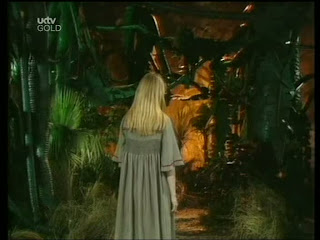 Doctor: Patrick Troughton (2nd Doctor)
Doctor: Patrick Troughton (2nd Doctor)Companions: Jamie, Victoria
Written by: Brian Hayles
Directed by: Derek Martinus
Editor's Note: Hey guys! Matt here stepping in real quick to mention that this week's blog is brought to you by Cassandra, who crushed it when talking about this week's story. But never fear! I'll be back next week with some thoughts on "Meglos", and as always keep checking out "The Doctor's Companion" for even more Classic Who discussion. Awesome stuff coming up. BUT FIRST! I'll let Cassandra kick things off!
Background & Significance: Ice Warriors, mofos!
 I'm really excited to talk about this story because this is the first Troughton story I get to discuss, and I love Ice Warriors. Like, love. I don't care that they look silly or they hiss and it's hard to understand what they're talking about. They're freaking sweet.
I'm really excited to talk about this story because this is the first Troughton story I get to discuss, and I love Ice Warriors. Like, love. I don't care that they look silly or they hiss and it's hard to understand what they're talking about. They're freaking sweet.Of course, this is the first story featuring the Martian race known as the Ice Warriors, and it's a really great first outing for them. Creator (and writer of this and every subsequent Classic story involving the Ice Warriors) Brian Hayles was approached by producer Innes Lloyd and script editor Peter Bryant to create a new recurring alien race for the Doctor to go up against, much like the Daleks and the Cybermen. Of course, the Ice Warriors wouldn't be utilized as often--they only show up in three stories after this one--but they're still, in my humble opinion, a great and iconic Doctor Who villain.
 This story also deals with the idea of weather manipulation, which is a recurring theme in this era, starting with "The Moonbase". While so scientifically inaccurate it's insane, it's a lot of fun to be able to trace the various ideas people were entertaining at the time and how that bleeds into the social consciousness through a popular show like Doctor Who.
This story also deals with the idea of weather manipulation, which is a recurring theme in this era, starting with "The Moonbase". While so scientifically inaccurate it's insane, it's a lot of fun to be able to trace the various ideas people were entertaining at the time and how that bleeds into the social consciousness through a popular show like Doctor Who.Of course, this is one of those stories thought lost to the ages at first, but thankfully was mostly recovered, with only two out of the six episodes missing (which is quite lucky, when you consider all the other stories missing in their entirety).
But enough of all that. Let's take a closer look, shall we?














